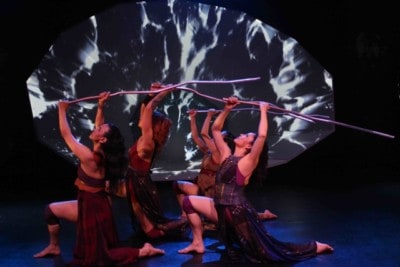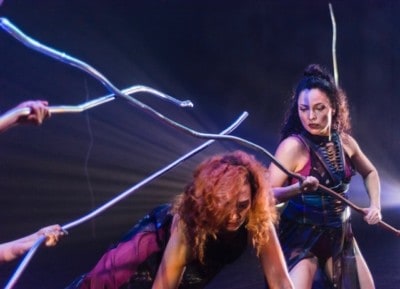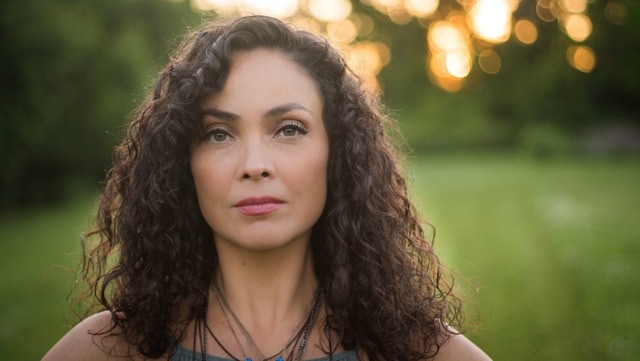Blood Tides, the latest work from Artistic Director Santee Smith, is an inter-generational, inter-cultural, and interdisciplinary performance, exploring Indigenous rites of passage, resurgent actions and reconstruction of Indigenous feminine identity.
This week, we caught up with Santee Smith to find out the process behind the work, and what she hopes will come out of it.
SDTC: How has Blood Tides evolved since your initial conception of it? How did the other performers involved help to shape the work?
SS: Blood Tides is the second work within Kaha:wi Dance Theatre’s triptych series on rematriation. I began exploring concepts by bringing together incredible artists Christie Belcourt, Monique Mojica, Leanne Simpson and France Rings (AU) to my family home on Six Nations near Brantford, Ontario, for a weekend of conversation. We talked about our lives, our daughters, mothers and grandmothers, the status of women in our communities and what we were doing as artists to deal with issues such as Murdered and Missing Indigenous Women #MMIW, gender inequities underlying Canada’s Indian Act policy and combating institutionalized patriarchy daily.
Sourced from dialogue, themes and imagery emerged that inform the vision of the triptych. The dramaturgical image model we worked with was that of a traditional pottery vessel as a metaphor for a woman’s body and womb.
My role as creator/director is to weave the ideas and imagery, and build the fitting collaborative team with Indigenous women holding the creative control. Development of the movement language and staging is a fluid process; it allows performers’ ancestry, experience and individual voice to shine through. Artists are interpreters and activators and together we are mindful to keep in the forefront creating from a Konkwehon:we (Indigenous women’s) worldview.

Photo by Semiah Smith
You describe Blood Tides as exploring “embodied actions for ‘dealing and healing’ from trauma through restoration of rites of passage and re-establishing sacred alignments from cosmos to womb.” Can you tell us a bit more about what that looks like when it is conveyed through dance?
Through the work, we establish our own ceremonial process by acknowledging our female ancestors, elemental forces such as land, water and lightning, and working with our personal sacred items. This allows us to dive into the territory of transformation in a protected way. Daily opening and closing protocols, incantations, smudging, and sacred medicines charge the process and space to access portals to transformation. This opens the space to question: When ceremonies have been put into a colonial sleep, how can we reawaken them? How can women occupy space from internal to external in a sovereign way? How did our ancestors honour feminine forces and their reproductive bodies?
A large aspect of the research looked at the Ohero:kon rites of passage practices reinstated in Akwesasne Mohawk territory by Blood Tides cultural advisor Louise McDonald (Mohawk Clanmother). The symbolic integration of fasting lodges allows performers to physically and symbolically return to the fertile darkness of the womb for self-reflection. The transformational space encourages the women’s dreaming, activation of ancestral deities, and shedding and healing from past traumas.

Photo by Ian R. Maracle
In doing research for Blood Tides, was there anything you came across that stood out to you or altered your perception?
Through my research, what stands out is the essential re-storying required for Indigenous women. What we are taught about ourselves and our bodies is based on colonial lies: women as inferior and property, menstruation as dirty, her body shameful and expendable. In fact, pre-colonial reality was flipped for Onkwehon:we society: women were leaders, upheld power, her voice was Mother Law, she was respected as a sustainer of life and governed over the children and home land.
Māori author, activist and Blood Tides cultural advisor/outside eye Ngāhuia Murphy’s statement sums it up: “When we bleed we retreat into ceremony, coming into union with our matrilineal lines. Our blood assures the continuation of our Tribal Nations. Our blood is a ritual of purification and renewal. Through the blood we shed the trauma of our colonial histories and activate our ancient relationships with female deities of the earth, water, winds, fire and sky. We call them all in through Blood Tides, waking the sacred teachings that will feed our spirits and return us to wholeness. Women are the cradle of the generations, the temple of humanity, the first territory. When we heal and empower ourselves, we liberate the people.”
Who is the intended audience for Blood Tides and what would you like to see come out of it?
Blood Tides is for audiences seeking performances that ask them to feel and then to reflect post-performance on the experience. Blood Tides is situated in the context of today and is a critical response to #MeToo issues and toxic masculinity. For women, it recognizes the transformational power in all of her phases of life and the importance of her rites and rights. Blood Tides may offer men insight and understanding into how they stand in relation to women and to reflect on social problems of consent, privilege, entitlement and the “boys will be boys” mentality.
Blood Tides is important for young women to watch as it demonstrates that she may be many things: warrior, leader, mother, divine goddess, creator, thresholder of life and death, huntress, a future ancestor. She can be tender and fierce, she can be fluid as water and electric as lightning; she is boundless, sacred and she can and should tap into her own powers.
How has developing and performing this work felt for you personally?
Developing and performing Blood Tides has allowed me to acknowledge the stages of my life, and come to terms with my life experiences, to heal myself from colonial thinking about who I am and to be grounded in my identity. It has connected me to amazing women, and I have learned so much about honouring the power that inherently resides within my reproductive body.
Blood Tides opens on Thursday, February 14 at Harbourfront Centre’s Fleck Dance Theatre (207 Queen Quay W). Get tickets here.



 Follow Us On Instagram
Follow Us On Instagram
